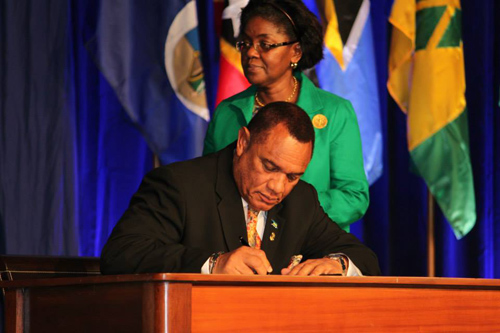
PORT OF SPAIN, Trinidad and Tobago — Prime Minister the Rt. Hon. Perry G. Christie described the Caribbean Community (CARICOM) that consists of countries with common experiences, as a project, which is still a work in progress.
“In recent years, there has been some marked and opened impatience with the pace of the CARICOM project, but I am pleased to recognise that the journey continues.
“It is often said that if CARICOM did not exist, it would have to be invented. I believe that,” the Prime Minister said during his address at the CARICOM Heads of Government Meeting, in Port of Spain, Trinidad and Tobago, Wednesday, July 3, 2013.
He said The Bahamas subscribes to the view that as small nations, Caribbean countries benefit from sharing common and not so common experiences.
“It is a wonderful experience and a great comfort to know that at a moment’s notice if there is an issue or problem which arises in The Bahamas, the assistance is only a phone call away, and a short distance away by air and sea.”
However, Prime Minister Christie said not everything is “rosy” and the Caribbean Community cannot sit and pat its back for all that it has achieved.
“We must all admit to the fact that there are real challenges which face us.
“Amongst them are; the challenges of transitioning from an agrarian economy to a service economy; the challenges of unemployment and under employment, particularly with our youth; the challenge of crime and violence; the disequilibrium between the development of young males and young females in the society; the undermining of our economies by heavy debt burdens while at the same time developed economies impose unfunded mandates on our countries; the challenge of educating our young people; the challenge of climate change and coastal erosion; indeed the very challenge of survival.”
He said the challenge to the current leadership of the region is to guarantee to the future generations of citizens so that they would have an opportunity to see and feel and enjoy the natural assets and romance of the countries in the same way the residents do today.
“The CARICOM project is the vehicle to help solve these problems and overcome these challenges.
The Prime Minister noted that The Bahamas’ security agenda and fight against crime is unremitting, and the country is engaged actively in seeking solutions pan Caribbean wide to these thorny problems.
“The Bahamas is pleased to recall the lobbying which took place in the United Nations by regional nations that led to the signing of the Small Arms Treaty on 3rd June.
“It was a stellar achievement and the CARICOM region led the way in the world for this treaty to come into force. This was but a small step in seeking to fight the violence from guns, which plagues all of our societies.”
He said a delegation of American officials has visited The Bahamas and are working very closely on several initiatives with local authorities to fight crime and to enhance security.
“But we must do more to impress upon our friends and neighbours that stability of our democracies and the stability of our countries are directly connected to the extent to which there can be a greater sharing in the strategies employed to address these challenges.”
He said more must be done to help with development; to strengthen the sharing of intelligence and funding resources with respect to deportees coming back to the region; more must be done to help in the education of the Caribbean region’s populations.
“Indeed is not it a fundamental irony that when we are most challenged for resources, when our traditional partners are cutting back on funding for our countries, our young people who gain their education at public expense in the region are more and more moving to the United States and to Canada. So we are paying for the expertise, which enriches their societies.
Prime Minister Christie said, “It is therefore incumbent upon us to make the case that the developed countries have an obligation, dare I say, a moral obligation in all of the circumstances, to give back to our societies.”







